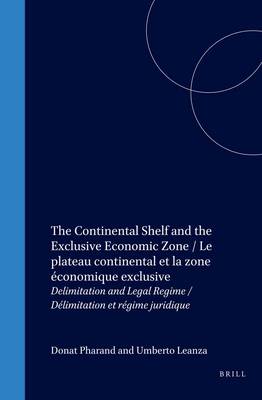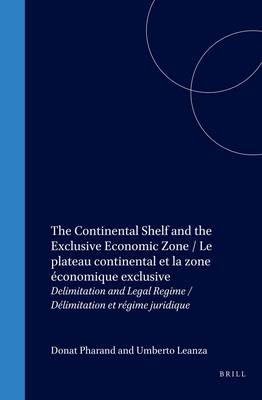
- Retrait gratuit dans votre magasin Club
- 7.000.000 titres dans notre catalogue
- Payer en toute sécurité
- Toujours un magasin près de chez vous
- Retrait gratuit dans votre magasin Club
- 7.000.000 titres dans notre catalogue
- Payer en toute sécurité
- Toujours un magasin près de chez vous
The Continental Shelf and the Exclusive Economic Zone / Le Plateau Continental Et La Zone Économique Exclusive
192,45 €
+ 384 points
Description
This volume focuses on both the general aspects of two of the most typical institutions introduced by the new Law of the Sea and the specific aspects related to the geographic and economic circumstances of Italy and Canada. It is divided into two parts. The first part deals with the delimitation of maritime boundaries, especially with respect to the continental shelf and the exclusive economic zone. The problem is approached from both a theoretical and a practical point of view, in particular, in analyzing not only the more well-known controversies in delimitation solved by international agreements or by international courts, but also still unsettled disputes in which Italy and Canada are involved.
The second part deals with the legal regime of the continental shelf and the exclusive zone and the activities - in particular exploration and exploitation - carried out in them. The same approach as in Part One is used in juxtaposing Italian and Canadian views on relative regulation.
Indeed, the volume brings together the diverse legal experience of the two countries - Italy and Canada - resulting from the different geographic, political and economic conditions found in each. It is enough to think that Italy is surrounded on three sides by a closed or semiclosed sea, the Mediterranean, while Canada borders on the Atlantic, Pacific and Arctic Oceans.
The volume was financed by the Italian National Research Council (CNR) and edited by Donat Pharand, Professor Emiritus of International Law at the University of Ottawa, and Umberto Leanza, Full Professor of International Law at the University of Rome, 'Tor Vergata'.
The second part deals with the legal regime of the continental shelf and the exclusive zone and the activities - in particular exploration and exploitation - carried out in them. The same approach as in Part One is used in juxtaposing Italian and Canadian views on relative regulation.
Indeed, the volume brings together the diverse legal experience of the two countries - Italy and Canada - resulting from the different geographic, political and economic conditions found in each. It is enough to think that Italy is surrounded on three sides by a closed or semiclosed sea, the Mediterranean, while Canada borders on the Atlantic, Pacific and Arctic Oceans.
The volume was financed by the Italian National Research Council (CNR) and edited by Donat Pharand, Professor Emiritus of International Law at the University of Ottawa, and Umberto Leanza, Full Professor of International Law at the University of Rome, 'Tor Vergata'.
Spécifications
Parties prenantes
- Editeur:
Contenu
- Nombre de pages :
- 424
- Langue:
- Anglais
- Collection :
- Tome:
- n° 19
Caractéristiques
- EAN:
- 9780792320562
- Date de parution :
- 01-10-93
- Format:
- Livre relié
- Format numérique:
- Genaaid
- Dimensions :
- 155 mm x 235 mm
- Poids :
- 879 g






